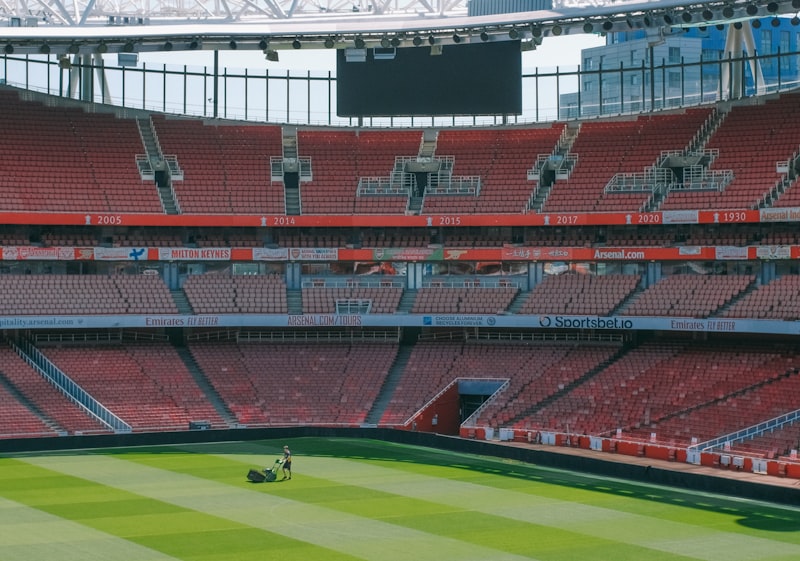Have you ever wondered where Arsenal, one of the most renowned football clubs in the world, hails from? Well, let me tell you, Arsenal is a club that originates from the beautiful country of England. Yes, you heard it right! This historic club has its roots firmly planted in the heart of England.
When we talk about Arsenal, we delve into a rich tapestry of footballing history. The club was formed in 1886 by workers from the Woolwich Arsenal Armament Factory, hence the name “Arsenal.” Initially, it started as a small team playing friendly matches, but soon it grew to become a powerhouse in English football.
Based in North London, Arsenal has made its mark not only in domestic competitions but also on the international stage. The club’s iconic red and white colors are instantly recognizable worldwide. With a passionate fanbase that spans the globe, Arsenal has cultivated a legacy that resonates throughout the footballing community.
Over the years, Arsenal has enjoyed tremendous success, clinching numerous league titles, FA Cups, and other prestigious honors. Under the guidance of legendary managers such as Herbert Chapman, Bertie Mee, and Arsène Wenger, the club has witnessed glorious triumphs and unforgettable moments.
The Emirates Stadium, Arsenal’s home ground since 2006, stands as a modern testament to the club’s ambition and dedication. This state-of-the-art stadium, nestled in the vibrant city of London, provides an awe-inspiring atmosphere for fans and players alike.
As you can see, Arsenal’s story is deeply ingrained in the fabric of English football. From its humble beginnings in the streets of Woolwich to the grandeur of the Emirates Stadium, this club has left an indelible mark on the sport. So, the next time you hear the name “Arsenal,” remember that it represents the pride and passion of a country that lives and breathes football – England.
The Origin Revealed: Arsenal Football Club’s Nationality Unveiled
Have you ever wondered about the origins of Arsenal Football Club? Well, get ready to unveil the fascinating details of this iconic club’s nationality. Brace yourself for an extraordinary journey through time that will shed light on the birthplace of one of the most renowned football teams in the world.
Let’s travel back to the late 19th century, specifically to Woolwich, a district in southeast London. It was here, in 1886, that the foundation of Arsenal FC took place. Originally known as Dial Square, the club was established by a group of workers from the Royal Arsenal armaments factory. These passionate individuals shared a common love for the beautiful game and decided to form a team to showcase their skills.
As the club continued to evolve, they changed their name to Royal Arsenal and later Woolwich Arsenal. The club’s early years were marked by participation in local leagues and friendly matches, but it wasn’t until 1893 that they made a significant move that would shape their future.
In that year, Arsenal FC relocated to North London, ultimately settling in the borough of Islington. This transformative move ignited a new era for the club, setting the stage for their rise to prominence in English football. The decision to transition to North London brought Arsenal closer to a larger fan base and opened doors to greater opportunities.
Fast forward to today, and Arsenal Football Club proudly represents the diverse and vibrant city of London. With its rich heritage and global fanbase, the club has become a true melting pot of cultures and nationalities. The players who have donned the famous red and white jersey throughout the years have come from all corners of the globe, showcasing the international appeal and allure of Arsenal FC.
Untangling the Roots: Exploring Arsenal FC’s Country of Origin
Are you curious to unravel the fascinating history behind Arsenal FC’s country of origin? Join me on an exploratory journey as we untangle the roots of this renowned football club. Arsenal FC, a powerhouse in English football, traces its origins back to the heart of Woolwich, a district in southeast London.
In the late 19th century, a group of workers from the Royal Arsenal armament factory came together to form a football team. This team would later evolve into the iconic Arsenal FC we know today. The club’s birthplace in Woolwich holds immense historical significance, as it was an important center for military production during that era.
As the years went by, Arsenal FC underwent a transformative period in its history. In 1913, the club made a pivotal decision to relocate to Highbury, North London. This move marked a new chapter for the club, solidifying its identity and setting the stage for its future successes.
The relocation to Highbury was a turning point for Arsenal FC, not only in terms of geographical location but also in terms of its competitive spirit. The club embraced its new home with fervor, building a stadium that would become synonymous with football excellence. The iconic Highbury Stadium witnessed the unfolding of countless thrilling matches and played a crucial role in shaping the legacy of Arsenal FC.
Fast forward to the present day, Arsenal FC stands tall as one of the most successful clubs in English football history. Their rich heritage and captivating style of play have garnered a worldwide following of passionate fans. Whether it’s the invincible season or the breathtaking attacking prowess, Arsenal FC has left an indelible mark on the beautiful game.
As we explore the roots of Arsenal FC’s country of origin, we unveil the story of a club that transcends boundaries. From the bustling streets of Woolwich to the vibrant atmosphere of Highbury, the journey of Arsenal FC is a testament to the enduring power of football and the love it inspires in fans all around the world.
The International Enigma: Decoding Arsenal’s Country Identity
Have you ever wondered about the country identity of a football club? One team that has puzzled fans and pundits alike is Arsenal. The London-based club has a rich history and a diverse squad, but when it comes to deciphering their country identity, it becomes a captivating enigma.
Arsenal, founded in 1886, is one of the oldest football clubs in England. Over the years, the club has attracted players from all corners of the globe, making it a truly international melting pot. From France to Brazil, Spain to Nigeria, Arsenal’s diverse roster reflects the global appeal of the beautiful game.
But amidst this cultural tapestry, one nation stands out as an integral part of Arsenal’s DNA: France. The French connection at the club runs deep, with a long list of influential French players leaving an indelible mark on Arsenal’s history. From Thierry Henry, the club’s all-time leading goal scorer, to Patrick Vieira, a midfield powerhouse, these French icons have defined an era for the Gunners.
What makes Arsenal’s French connection even more intriguing is the managerial influence. Arsène Wenger, a French tactician, revolutionized the club during his 22-year reign. Under Wenger’s guidance, Arsenal played an aesthetically pleasing style of football known as “Wengerball,” blending technical finesse with attacking flair.
The French influence extends beyond the pitch. Arsenal’s stadium, the Emirates, boasts architectural inspiration from the Louvre Museum in Paris, further emphasizing the club’s affinity for French culture and sophistication.
However, decoding Arsenal’s country identity isn’t a straightforward task. While France has played a prominent role, the club’s blend of nationalities adds layers of complexity. Spanish maestros like Cesc Fàbregas and Santi Cazorla, Dutch stars such as Dennis Bergkamp and Robin van Persie, and even British talents like Tony Adams have all played pivotal roles in shaping Arsenal’s identity.
In summary, Arsenal’s country identity remains an intriguing enigma. While the French influence is undeniable, the club’s international composition adds a captivating complexity. Whether you view Arsenal as a bastion of French elegance or a global powerhouse embracing diversity, there’s no denying the allure of decoding their country identity. So next time you watch the Gunners take the field, ponder over the intricate tapestry that makes up their unique footballing heritage.
From Whence Arsenal Came: Tracing the Nationality of This Football Powerhouse

Have you ever wondered about the origins of one of the most iconic football clubs in the world? Arsenal, a powerhouse in the footballing realm, has a rich history that stems from diverse nationalities and influences. Let’s embark on a journey to trace the roots of this formidable club.
Arsenal, based in North London, was founded in 1886 by a group of workers from the Royal Arsenal armament factory. While its early days were marked by an English core, the club soon embraced diversity. Over time, Arsenal became a melting pot of talent from various countries across the globe.
One of the pivotal moments in Arsenal’s history came in the late 1990s when Arsène Wenger, a French manager with a visionary approach, took the helm. Under Wenger’s leadership, the team underwent a cultural transformation. He introduced innovative training methods and scouting networks that helped attract talented players from all corners of the world. The arrival of foreign stars like Thierry Henry, Patrick Vieira, and Dennis Bergkamp revolutionized Arsenal’s playing style and brought unprecedented success.
In recent years, the club has continued to nurture a global outlook. Arsenal’s squad boasts players from diverse backgrounds, contributing to its international appeal. The rise of Mesut Özil from Germany, Pierre-Emerick Aubameyang from Gabon, and Alexandre Lacazette from France has further solidified Arsenal’s status as a global powerhouse.
Beyond the players, Arsenal has also been shaped by influential stakeholders from different nationalities. Stan Kroenke, an American businessman, is the majority owner of the club. His investment and strategic decisions have played a crucial role in shaping the club’s trajectory.

As we delve into the origins of Arsenal, it becomes evident that the club’s success is firmly grounded in its ability to embrace talent from around the world. The fusion of diverse nationalities, ideas, and playing styles has propelled Arsenal to the pinnacle of footballing greatness.
The story of Arsenal’s nationality is a captivating tale of how the club evolved into a global powerhouse. From its humble beginnings in England to its international reach today, Arsenal’s success can be attributed to the contributions of players, managers, and stakeholders from various backgrounds. This rich tapestry of nationalities continues to define and shape the legacy of one of football’s most celebrated institutions.